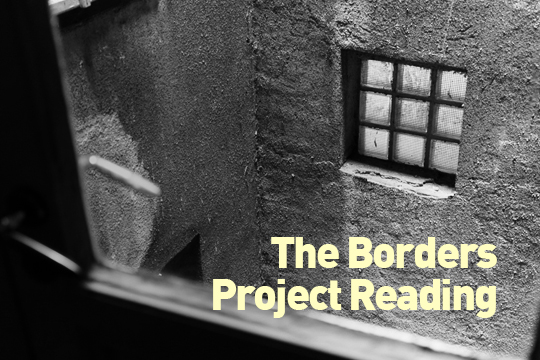The Borders Project gave its first reading in Atlanta recently. A multi-genre literary collaboration between the Sarajevo Writers’ Workshop and Atlanta’s Narrative Collective, the project aims to examine all sorts of boundary lines—physical, temporal, emotional, relational, among others—and their implications. Eighteen writers and one translator came together to create work in two languages. In this essay, Stacy Mattingly, founder and co-founder of the two constituent collectives, follows the process to the Atlanta reading.
1.
The Warhorse coffee shop at Atlanta’s Goat Farm Arts Center is a long room with a garage door on one end and a wall of bookshelves on the other. Hanging from the ceiling in front of the books is a large screen. On it is the face of a friend of mine in Sarajevo. The background is a field of stars. Selma Asotić is a head floating in outer space, reciting her English poem “The Nation.”
“You are /everything which does not love me. / You are / the curse I hide under my tongue …”
Those present are fixated on the image. Some make references in jest to Star Wars. We take photos to post online for Selma and others. Danny Davis, the Goat Farm’s technical director, stands at a ladder positioned below a projector and tells us not to worry—that starry background will definitely be gone before our event.
I am just relieved all the videos from overseas are working.
My colleagues and I are doing a run-through of our reading for The Borders Project, a literary collaboration involving two writing groups—Narrative Collective in Atlanta, Georgia, and the Sarajevo Writers’ Workshop (SWW) in Bosnia and Herzegovina. I belong to both, having launched SWW in 2012 and co-founded Narrative Collective with poet L.S. McKee in 2014.
Our event will feature in-the-flesh presentations from the Atlanta writers and brief video clips of SWW writers reading in either English or Bosnian/Croatian/Serbian. Some of the B/C/S-language videos include subtitles penned by our project translator, Asymptote editor-at-large Mirza Purić. For the last few days, I’ve been coordinating like mad with the SWW crew to prepare the clips so the range of work in our collaboration can be experienced by an audience here. Only one member, Daniela Valenta, due to her schedule, couldn’t manage to send hers.
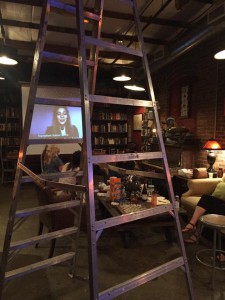
Dress rehearsal for The Borders Project reading in the Warhorse at Atlanta’s Goat Farm Arts Center. Onscreen is Kulović Selma reading from her short story “Klupko/Tangle.” English subtitles by the author.
As the rehearsal proceeds, we in the Atlanta group try out some blocking with production director Sean Haley, who will manage the reading. (Our Suzanne Mozes promises to bring him a bottle of whiskey.) Sean asks me when I’m going to have the SWW group come to the States so they can present their work in person.
That, I say, is a goal.
2.
We began The Borders Project in October 2015, when our two groups—nineteen of us in all—decided to get to know each other and create new work. I’d been trying for a while to envision a way to connect these communities, as I believed they would have a lot to offer each other both relationally and artistically. We conceived of the project at a time when migration across Europe had intensified and people were getting stopped en masse at borders, particularly in the Balkans. One of our members in Sarajevo suggested we call the project something like “No Borders.” But after discussion, we decided to stay with the original theme, using our collaboration to examine all kinds of boundary lines—physical, temporal, emotional, relational, etc.—as well as their implications. The word “borders,” it was agreed, could suggest both the presence and the absence of limits.
Over the next few months, we posted poetry, fiction, and essays to an online forum. Mirza in Sarajevo translated rapid-fire the B/C/S pieces into English. We put up the originals and the translations and held written discussion, too, in English. On occasion, we met live via video; cameos were made by various pets.
After the workshop phase, we revised our pieces for public presentation (i.e., the Goat Farm reading). We aim to have the whole body of work translated into both English and B/C/S so we can publish in journals and perhaps create a bilingual anthology.
3.
On event day, Saturday, May 21, I drive across town to the Goat Farm, where I also have a residency. In the late-nineteenth century, the campus of redbrick structures was used for cotton gin manufacturing. It is now host to 200 artist studios and some performance spaces. Narrative Collective meets weekly at the Warhorse—with evening coming on, Sean has transformed the space into a theater of sorts, and Suzanne Mozes has, indeed, delivered his whiskey.
The rest of our group is in force: L.S. (Laura) McKee, Rachael Maddux, Esther Lee, and Kate Tuttle, who arrives with her husband, our de facto DJ. (He starts us off with Madonna’s “Borderline.”) Melanie Jordan makes a late entrance, having been liberated from gridlock on the interstate. For a moment, it appears we might have technical difficulties with the videos and I feel myself become short of breath, but Sean works it all out in short order.
Dobra večer i dobro došli. Welcome and good evening. Laura and I introduce the project as the sun goes down. Sitting in the audience with my mother and brother is a friend from Eastern Bosnia who came to the US as a refugee after the ’90s war and has recently finished her PhD. I’m anxious to get her reaction to the body of work, as she may be the only person present able engage with the readings in both languages.
Melanie Jordan starts us off, sharing what she dubs “weird love poems” that are, in fact, discomfiting, sensual, and textured. Her “Three Quarters of the Way through the Poem” describes the intrusion of an imagined lover who appears in various guises and locales. I know the poem, yet I squirm. These lines stick: “I don’t know why he shows up when he does, / in this driveby way or why he’s stuffed himself / behind the wallpaper…, / between the pages of the book I’m trying / to write.”
She then introduces our first clip—of Dijala Hasanbegović , minus the starry backdrop, whose poetry collection, Neće biti djece za rat /Kids for War, is due out in Bosnia and Herzegovina this year. (Translations of pieces from the manuscript were published in Asymptote). Dijala recites her poem “Graničari/Frontierspeople,” which with its insistent, unsettling refrain, “Reci mi!” (“Tell me!”), dramatizes the speaker’s separation from a “he” (a lover?) as they press, literally or figuratively, uphill: “now let me climb without looking at you / for once I’m up there I won’t need you.”
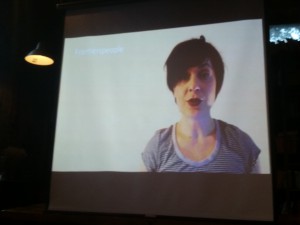
Dijala Hasanbegović recites her poem “Graničari/Frontierspeople.” English subtitles by Mirza Purić.
Next is a clip from Kulović Selma’s short story “Klupko/Tangle.” Her subtitles, which she translated, elicit laughter. The narrator says of her mother, “We hurt her while being born and we hurt her by being born.” The piece recounts the isolation of two daughters from this mother, an eccentric, fur-coat-wearing figure, who creates an invisible border in their apartment in order to reserve her own boudoir-like space. The piece is witty, charming, and emotionally resonant. At the end of the video, the author’s cat makes a cameo.
Esther Lee reads poems from her “Labanotation” series, exploring both exile and inclusion. She is paired with Selma Asotić, who recites the English poem “The Nation,” and Esther’s husband later points out the two women use the same imagery—a teacup. (He would love to see them read together live, he tells me.) Here are lines from Esther’s first piece: “… what / you wouldn’t do to see / what you never see / in reverse—skyward rain, / teacup reassembling / and jumping back / onto the counter…” Selma’s speaker says to the nation, “You are / mother’s madness / stirring in a teacup.”
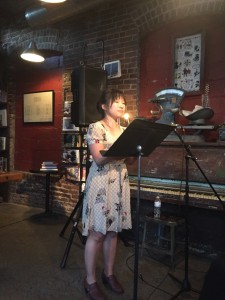
Esther Lee reads from her poem series “Labanotation.”
Toward the middle of the program, Marina Alagić-Bowder’s clip from her essay “Hladno/Cold” about working in a refugee camp in Croatia at the end of the ’90s war sets out the context of the nation/region so plainly people gasp. Her video ends with the description of a Bosnian woman whose biographical details Marina is late in learning—“that Serb soldiers raped her and shot her husband.”
The audience draws air. I wince, worried my friend from Eastern Bosnia might be jarred by that direct statement, as some of the worst atrocities during the war occurred in her region. Later, though, she tells me she found Marina’s clip vital to the reading. A straight line through a maze. Needed context.
4.
Rachael Maddux listens so intently she needs a nudge to rise. She reads from her essay “Invisible Bumps,” an idyllic piece about a childhood beach trip with death around the edges—the Oklahoma City bombing, an aging grandparent, the evidence of slavery. Rachael’s piece confronts darkness with a wry transparency, and she goes on to introduce two SWW writers who also use humor and/or irony. Matea Šimić’s story “Papercuts” offers a cast of struggling characters. Her animated reading and Mirza’s subtitles prompt laughter, especially here: “She didn’t want to see anyone or listen to claptrap about who kissed whom at Ivana’s birthday party on Saturday right and proper, tongue and all!, who was caught still listening to Spice Girls, and whose parents got a huge phone bill because their son was phoning sexy ladies who pant in the receiver….” Maire Ryan’s clip, which follows, opens with a scene from her essay “Between Stained Carpets,” in which the speaker vomits “loudly in the bush to the left of the house” and then discovers, inside, one of her parents passed out on the floor.
In my seat, I am struck by the work’s accumulating poignancy and have the sense that something special is happening. Watching my SWW friends onscreen, I feel as though they are in the room, and when my turn comes, I can’t help but remark aloud how happy I am to see them. The excerpt I read is from my short story “Prague-Berlin Train” about a kind of love triangle. Two friends discuss the human tendency to return to certain behaviors—“Like a dog to its vomit,” my narrator says, speaking of history and, perhaps, of herself.
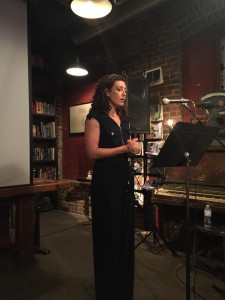
Suzanne Mozes reads from her nonfiction piece “The Lost Cause Religion”.
I introduce Naida Avdović , who will share in B/C/S without subtitles from her story “Registracija /Registration,” which, I explain, is about an elderly man, Menso, who goes for coffee, only to find he has to extract it from a machine requiring him to register as a user. While most of the audience can’t follow the original language, the wit and attitude in Naida’s delivery translate.
The character Alva, in the poems Laura gets up to read, is also elderly. Alva watches a young boy swim across a pool; she visits the ophthalmologist’s office; she is losing her sight. “You see, sooner or later, everything falters / into radiance,” one passage goes. I am moved by both Laura’s and Naida’s ability to create and empathize with characters so much older than they and via different stylistic approaches.
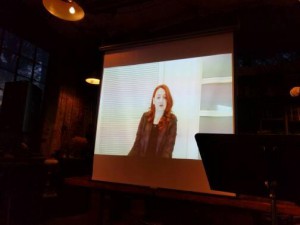
Naida Avdović presents an excerpt from her short story “Registracija/Registration.”
Sandwiched between them is Neđla Ćemanović, who presents an excerpt of her English story “You’ll Be Me.” Her protagonist, by contrast, is a young Bosnian woman tempted by an unconventional job offer from a male cousin in Austria—to dress and work as if she were he.
The consideration of borders—between people, between individuals and the world, between us and those we’ve lost, between aspects of the self—piles up. Zerina Zahirović, filmed in a dark room, reads from her poem “Zubi/Teeth,” also without subtitles, about the death of the speaker’s mother. Here is a bit of Zerina’s rough, moving translation: “… [T]hroughout February we / pulled each other’s hair, my mornings were mocking / birds, I opened their / cages …”
Suzanne Mozes’s excerpt also deals with death, if remotely—hers is an investigative piece called “The Lost Cause Religion” about a possible Civil War cemetery in an Atlanta neighborhood. She ends with a quote from a source, who tells her, over whiskey and perhaps ironically, “Don’t be a Yankee messiah.”
Our last video clip is of Nermana Česko. She recites, in B/C/S without subtitles, her poem “Anoreksična sigurnost javnog gradskog prevoza/Anorexia Safety of Public Transport,” a piece about a mental health patient on a bus—another sort of dislocation.
Closing the evening, Kate Tuttle reads her compact essay, “Once Upon a Time at Ikea,” which explores longing, childhood, and fairy tales. I found these lines memorable for what they convey about a child’s awareness: “Those years that I imagined myself lost in the woods or hiding from a witch, our mother was drowning in depression, occasionally erupting into mania. I wanted to be as self-sufficient as Hansel and Gretel, whose parental abandonment terrified but did not shock me.”
5.
As people stand to chat, Kate’s husband resumes his role as DJ, playing music from the eighties and nineties. Later, Sean breaks down the chairs and tells us we have a dance floor. After a while, we will all caravan to Ticonderoga Club in Krog Street Market where at around midnight we will eat heaps of meat—an inadvertent homage to the Balkans.
Now, though, I am caught up in the emotions of the evening. On the patio, I talk with my friend from Eastern Bosnia—she tells me she appreciated the variety in the work and laughed aloud with some of the B/C/S videos, one of which was Naida’s story about the elderly man having to register as a user at a coffee machine. I ask my friend whether she thought the piece might have political implications—i.e., via this idea of having to register or identify oneself. She says perhaps. (Naida later explains she didn’t intend the story to be political.) Standing with us, Rachael Maddux says she would’ve missed such a layer in the piece entirely, not having knowledge of the Bosnian political scene. Borders remain between us even in art, she says. Even in this project.
But I find my thoughts moving in the opposite direction. Taking in the excerpts one after the other, I was overcome by the universality in the work. We were asked to consider aging, death, family, oppression, the struggle to love, loss, bliss, brutality, the comic—the gamut of our shared humanity. We do not all suffer the same experiences. Political realities differ. Brokenness cuts through relationships in different ways. Privilege usurps justice. War alters, destroys, and displaces. I have often contemplated these things, both traveling back and forth to the Balkans and seeing, especially now, the violence in my own country. Borders do separate us. But at the core—while history, leaders and groups, and our current time may suggest otherwise—we are one species. Listening to the work of these friends, who may be divided by so much, I felt connected.
Stacy Mattingly is a U.S. writer and the founder of the Sarajevo Writers’ Workshop, a bilingual group of poets and prose writers in Bosnia and Herzegovina. She also co-founded Atlanta’s Narrative Collective with poet L.S. McKee. Stacy holds an MFA in fiction from Boston University, where she was a Marcia Trimble Fellow, a Leslie Epstein Global Fellow, and recipient of the Florence Engel Randall Graduate Fiction Award. She has worked as a coauthor on books including, with Ashley Smith, the New York Times bestseller UNLIKELY ANGEL, an Atlanta hostage story released last fall as a feature film, CAPTIVE. Stacy has taught creative writing at Boston University and helped lead the first Narrative Witness exchange for the University of Iowa’s International Writing Program. She has recently completed a first novel, set in the current-day Balkans.
Headline image courtesy of Vanja Čerimagić.
*****
Read More from Sarajevo:

